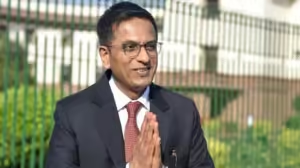

Chief Justice of India D.Y. Chandrachud has been at the forefront of several significant judicial reforms and key rulings since his tenure began on November 9, 2022. Here’s a detailed look at the latest updates on his initiatives and notable decisions.
Judicial Reforms and Modernization
- Technological Advancements:
- CJI Chandrachud has been instrumental in integrating technology into the judicial system. He launched the e-Supreme Court Reports (eSCR) project, making all Supreme Court reports available digitally with a search facility, free of cost.
- The Supreme Court has also adopted hybrid hearings, with CJI Chandrachud ensuring that virtual appearances remain an option for lawyers and litigants. High Courts have been directed to provide free Wi-Fi to facilitate this.
- E-Courts and Digital Transformation:
- The e-courts project has received a significant boost, with a budget exceeding Rs. 7,000 crores aimed at digitizing lower district courts. This initiative is part of a broader vision to make the judiciary more efficient and accessible.
- The Supreme Court has entered into an MoU with IIT Madras to facilitate the digital transformation of the Indian judiciary, further enhancing its technological capabilities.
- New Courtrooms and Infrastructure:
- CJI Chandrachud announced the construction of a new building with 27 fresh courtrooms and four registrar courts, aimed at increasing the strength of judges and streamlining administrative functions.
Key Rulings and Decisions
- Constitutional Issues:
- In Justice K.S. Puttaswamy v Union of India, CJI Chandrachud authored the majority decision recognizing the right to privacy as a fundamental right under the Constitution.
- He also delivered a concurring opinion in Shafin Jahan v Ashokan K.M., upholding Hadiya’s choice of religion and marriage partner, emphasizing the right to privacy and personal liberty.
- Criminal Justice Reforms:
- CJI Chandrachud praised the newly enacted criminal justice laws, including the Bharatiya Nyaya Sanhita, Bharatiya Nagarik Suraksha Sanhita, and Bharatiya Sakshya Act. These laws aim to safeguard victim rights and enhance investigation and prosecution efficiency.
- He highlighted the challenges posed by technological advancements in crime and the need for the criminal justice system to adapt to these changes.
- LGBTQIA+ Rights:
- In Navtej Johar v Union of India, CJI Chandrachud wrote a separate concurring opinion decriminalizing section 377 of the Indian Penal Code, making same-sex intercourse legal. He emphasized that this was a first step in guaranteeing constitutional rights to LGBT individuals.
- The Supreme Court has also taken steps to include the LGBTQIA+ community, creating universal restrooms and making the online appearance portal gender-neutral.
Cybercrime and Digital Safety
- Cyber Impersonation:
- CJI Chandrachud has addressed the issue of cyber impersonation, where scammers pose as high-ranking officials. This has led to increased vigilance and measures to protect judicial officials from such scams.
- Digital Evidence and Investigations:
- The new criminal justice laws emphasize the need for adapting to technological advancements in crime. CJI Chandrachud has highlighted the importance of addressing digital evidence admission issues and investigative challenges in the modern era.
Administrative Reforms
- Case Listing and Prioritization:
- To prioritize cases involving personal liberty, CJI Chandrachud directed that ten bail applications and ten transfer petitions should be listed before every bench of the Supreme Court every day. This ensures that cases involving individual freedoms are given due importance.
- Global Outreach and Collaboration:
- CJI Chandrachud has led the Indian delegation in international judicial conferences, fostering effective judicial cooperation among member states. This includes his participation in the Shanghai Cooperation Organisation meeting.
Conclusion
CJI D.Y. Chandrachud’s tenure has been marked by significant reforms aimed at modernizing the judiciary, enhancing efficiency, and ensuring inclusivity. His efforts to integrate technology, address cybercrime, and deliver key rulings have set a new standard for the Indian judicial system. As he continues to lead the judiciary, his vision for a more accessible, efficient, and inclusive justice system remains a focal point.This article provides a detailed look at the latest updates on CJI D.Y. Chandrachud’s judicial reforms, key rulings, and efforts to combat cybercrime, making it a valuable resource for those interested in Indian law and judicial developments.
Discover more from
Subscribe to get the latest posts sent to your email.







